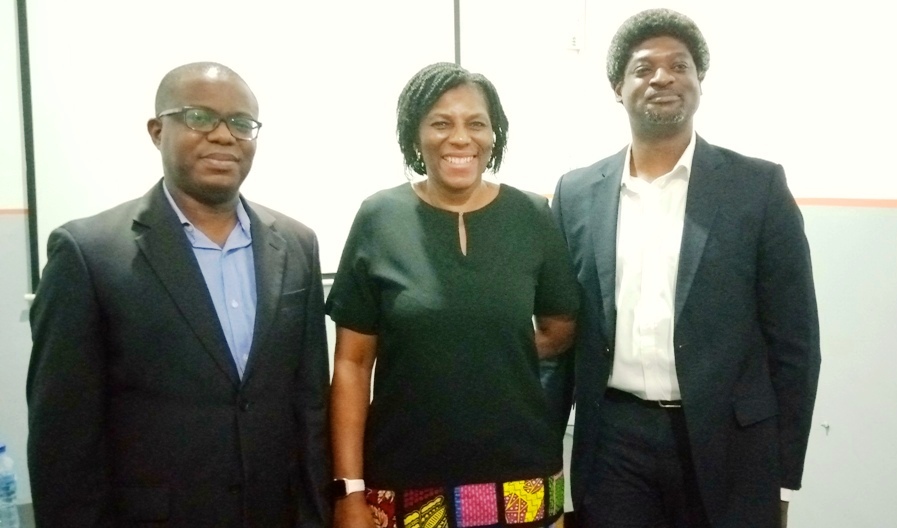E-Business
Jumia Reports Strong Second Quarter 2019 Results

Jumia Technologies has announced its financial results for the quarter ended June 30, 2019.
Jeremy Hodara, co-CEOs of Jumia, in a statement released on Thursday said, “We continue to deliver on our financial strategy of generating strong growth of our topline drivers, while accelerating monetization, driving cost efficiencies and developing JumiaPay.
“During the second quarter of 2019, our GMV increased by 69% year-on-year and our Gross profit grew by 94%.
“Our Adjusted EBITDA loss as a percentage of GMV decreased by 562 basis points (5.62 percentage points) and our Operating loss, amounting to €66.7 million, decreased as a percentage of GMV by 148 basis points (1.48 percentage points)
“These results reflect our continued focus on offering a relevant and engaging online shopping and lifestyle destination for consumers, while providing our sellers with an attractive value proposition and a platform to grow their businesses.
“We remain focused on all aspects of our growth strategy, particularly JumiaPay, as we continue to drive its usage in our markets.”
Juliet Anammah, CEO, Jumia Nigeria, giving an insight on the business and financial records of the company, said that GMV increased this quarter by 69% compared to the second quarter of 2018, due to a variety of factors, including strong marketplace growth and robust consumer acquisition and re-engagement momentum.
She added that the number of Active Consumers at June 30, 2019 was 4.8 million, up from 3.2 million a year ago and 4.3 million at the end of the first quarter of 2019.
According to her, “These increases are a result of our continued focus on selection, price and convenience, as we strive to be the preferred online shopping destination for consumers in Africa for all their daily needs.
“During the second quarter of 2019, we continued to increase the assortment available on our platform and to engage with consumers through relevant local commercial campaigns such as our “Mobile Week” and “Ramadan” campaigns”
The company further stated that they are committed to development and scaling JumiaPay to other regions in Africa.
“JumiaPay remained a key focus area and it is now offered in six countries – Nigeria, Egypt, Ivory Coast, Ghana, Morocco and Kenya.
“Collectively, these six countries represented a combined population of almost 440 million people in 2018, according to data from the United Nations Population Division.
“We have also expanded the scope of JumiaPay beyond our physical goods marketplace.
“As of December 31, 2018, JumiaPay was only available within our physical goods marketplace.
“It is now also available within our on-demand services, Jumia Food, and hotel booking portals, Jumia Travel, in selected countries.
“Lastly, we continued to expand the range of financial and digital services available from third parties, powered by JumiaPay, offering our consumers an increasing range of relevant every day services.
“In Nigeria for instance, consumers can now access micro-loans offered by a local fintech startup, alongside event tickets offered by a local event ticketing provider.
“In Egypt, in the second quarter of 2019, we started distributing services from a local deals provider allowing consumers to purchase their vouchers on the Jumia platform, using JumiaPay”.
The company further revealed that their marketplace revenue increased by 89.7% in the second quarter of 2019 compared to the second quarter of 2018, on the back of strong revenue growth across all components of Marketplace revenue.
“Commissions, which are charged to our sellers, grew by 91.8%.Fulfillment, which are delivery fees charged to consumers, grew by 102.6%.
“Marketing & Advertising, which include performance marketing campaigns, or the placement of banners on our platform, grew by 489.5%.
“This strong growth was driven by an acceleration in brand marketing contributions, aimed at promoting the visibility of their products on our platform.
“Value Added Services, which include revenue from services charged to our sellers such as logistics services, packaging, or content creation, grew by 47.4%.
“First Party revenue increased by 39.2% in the second quarter of 2019 compared to the second quarter of 2018.
“We undertake our first party activity in an opportunistic manner to complement the breadth of product assortment on our platform, usually in areas where we see unmet consumer demand.
“Shifts in the mix between first party and marketplace activities trigger substantial variations in our Revenue as we record the full sales price net of returns as First Party revenue and only commissions and fees in the case of Marketplace revenue.
“Accordingly, we steer our operations not on the basis of our total Revenue, but rather on the basis of Gross profit, as changes between third-party and first-party sales mix are largely eliminated at the Gross profit level.
“Over time, it is our goal to reduce the proportion of first party activity in favor of third-party activity at group level. This strategy may however vary from quarter to quarter and from country to country”.
E-Business
Natasha: TMG Demands Probe of Alleged Data Breach in Failed Recall

Transition Monitoring Group (TMG) has called on the National Data Protection Commission (NDPC) to investigate what it described as an alleged unauthorised and fraudulent use of personal data of constituents in the failed recall attempt of Natasha Akpoti-Uduaghan, Senator representing Kogi Central in the National Assembly.

The organisation expressed concern that voters’ personal information may have been illegally harvested and deployed without their consent to generate signatures for the recall petition.
Speaking at a press briefing in Abuja, Auwal Rafsanjani, chairman, TMG, observed that such an act amounts to a gross violation of the Data Protection Act, which he said, also undermines public trust in the country’s democratic process.
He called for a forensic verification of the Voter Identification Numbers (VINs) submitted in the recall process, using the Bimodal Voter Accreditation System (BVAS).
TMG’s position came a few days after the Independent National Electoral Commission (INEC) dismissed the petition seeking to recall Natasha for failing to meet constitutional requirements.
The commission had revealed that following a thorough review of the signatures and thumbprints submitted by petitioners, only 208,132 signatories were verified, falling short of the required 237,278.
Rafsanjani, however, expressed concern on how more than 50 per cent of total registered voters in Kogi Central quickly turned up to sign the petition for the recall of Natasha in a country, he said, has historically experienced a worrisome level of voter apathy.
According to him, the incident calls for deeper insight that can only be brought about through thorough investigation.
“While it is noted that INEC has terminated the process at the stage of counting signatories to the petition as the number of signatories did not meet the constitutional requirements for further verification, the seeming fraud of harvesting voters’ details from anywhere to file the petition cannot be overlooked,” he said.
Rafsanjani added: “We are also deeply worried that against the provision of the Data Protection Act, personal data of citizens of Kogi Central Senatorial District have been harvested and used without their consent. This fraud must be investigated by the National Data Protection Commission to assure Nigerians that their personal data will indeed be protected as envisaged by the law.
“Further investigations to verify and authenticate the Voter Identification Number (VIN) through the BVAS must be carried out. Where investigations reveal a fraudulent process, the petitioners must be brought to justice to serve as deterrent to those who would be willing to be induced and used by politicians for this kind of charade in the future.”
But the NDPC, has, reiterated commitment to enhancing data privacy among public and private bodies in the country.
Dr. Vincent Olatunji, national commissioner and CEO, said the commission aims to enforce stricter data protection measures to safeguard sensitive public and private information, as well as promote regulatory compliance in line with relevant laws.
E-Business
NDPC to Strengthen Data Privacy Practices in Nigeria

National Data Protection Commission (NDPC) has reaffirmed its commitment to strengthening data privacy practices across Nigeria’s public and private sectors.

Speaking at a regional capacity-building workshop in Katsina for ICT personnel from the north-western states, Dr Vincent Olatunji, national commissioner and chief executive officer of the NDPC, said the commission is stepping up enforcement of data protection regulations in line with national laws.
Olatunji, represented by Mr Princewill Nnaka, head of the Commission’s Enforcement Unit, noted that the NDPC is focused on raising awareness of data rights, improving staff training, and partnering with development agencies to boost capacity.
He said stronger data protection measures would help reduce incidents of cyberbullying, online financial fraud, and loss of lives due to breaches of privacy.
“Data protection is a global concern,” he said. “Our goal is to ensure Nigeria aligns with international standards in the safeguarding of personal data.”
Also speaking at the event, Naufal Ahmed, director general, Katsina State Directorate of ICT (KATDICT), said the training aimed to equip participants with the technical knowledge required to implement the Nigeria Data Protection Act (NDPA) 2023.
He added that the initiative would also enable participants to serve as Master Trainers and Data Protection Officers (DPOs) in their respective institutions.
The three-day programme drew 40 participants, including four officers each from Kaduna, Kebbi, Jigawa, Sokoto, and Zamfara States, as well as 16 officials from various ministries, departments, and agencies in Katsina State.
E-Business
CJN Warns Judicial Officials against Data Breaches, Cyber Attacks

Kudirat Kekere-Ekun, Chief Justice of Nigeria, has cautioned judicial officials to be vigilant against data breaches, cyber threats and vulnerabilities in online systems as the judiciary continues to adopt digital technology.

Kudirat Kekere-Ekun, Chief Justice of Nigeria,
Kekere-Ekun gave the caution while delivering a keynote address at the opening ceremony of the 2025 National Workshop on Information and Communication Technology, held at the National Judicial Institute in Abuja.
The CJN represented by Salisu Garba, administrator, National Judicial Institute, emphasised that, as the judiciary handles cases, files, personal information, and classified government data, it remains a prime target for cyber attacks.
She underscored the need to safeguard the integrity of court records, warning that any breach could carry serious legal consequences and pose risks to national security.
She said, “Thus, a strong cybersecurity framework must be implemented to safeguard judicial data from unauthorised access, hacking, and corruption.”
The CJN emphasised the need for judicial ICT personnel to receive proper training in cybersecurity best practices, encryption methods, and secure data management.
She commended the National Judicial Council for its proactive efforts in modernising the judiciary, noting that the Judiciary Information Technology Policy stands out as a key initiative, offering a clear framework for the effective deployment and use of ICT in court operations.
In his welcome address, Olumoh Abdulazeez, Institute’s Secretary, emphasised that the annual workshop was aimed at equipping court personnel with the skills needed to keep pace with technological advancements.
“The effective integration of technology can greatly enhance access to justice and lower the barriers for litigants.’”

 News3 days ago
News3 days agoAOT Issues Bench Warrant against Sanusi, Aero Contractors MD

 News3 days ago
News3 days agoUS Cancels Visas for All South Sudanese Passport Holders

 News3 days ago
News3 days agoMeningitis Outbreak Kills 151 in Nigeria – NCDC

 News3 days ago
News3 days agoSERAP Calls on Tinubu to Reject $1.08Bn Loan, Probe Missing Funds

 News3 days ago
News3 days agoAfrimash Launches USSD Code to Revolutionize Poultry Farming and Combat Counterfeit Farm Produce

 News2 days ago
News2 days agoHow KongaFM 103.7 Helped Cure My Insomnia Challenge

 News2 days ago
News2 days agoFG to Invest in Cutting-edge Broadcast Technology

 Broadcasting2 days ago
Broadcasting2 days agoMTN Battles Netflix, Showmax with New Streaming Platform

























